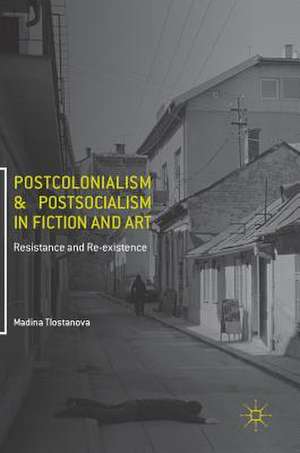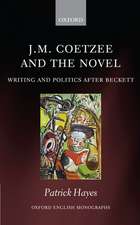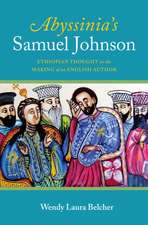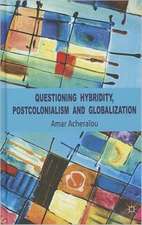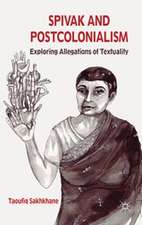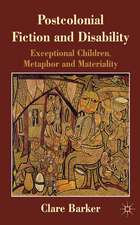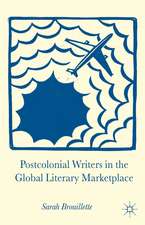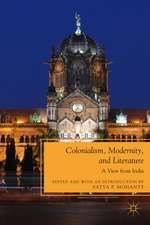Postcolonialism and Postsocialism in Fiction and Art: Resistance and Re-existence
Autor Madina Tlostanovaen Limba Engleză Hardback – 20 feb 2017
| Toate formatele și edițiile | Preț | Express |
|---|---|---|
| Paperback (1) | 635.80 lei 6-8 săpt. | |
| Springer International Publishing – 3 mai 2018 | 635.80 lei 6-8 săpt. | |
| Hardback (1) | 641.03 lei 6-8 săpt. | |
| Springer International Publishing – 20 feb 2017 | 641.03 lei 6-8 săpt. |
Preț: 641.03 lei
Preț vechi: 754.15 lei
-15% Nou
Puncte Express: 962
Preț estimativ în valută:
122.68€ • 133.21$ • 103.05£
122.68€ • 133.21$ • 103.05£
Carte tipărită la comandă
Livrare economică 23 aprilie-07 mai
Preluare comenzi: 021 569.72.76
Specificații
ISBN-13: 9783319484440
ISBN-10: 3319484443
Pagini: 224
Ilustrații: XI, 224 p. 10 illus.
Dimensiuni: 148 x 210 x 19 mm
Greutate: 0.44 kg
Ediția:1st ed. 2017
Editura: Springer International Publishing
Colecția Palgrave Macmillan
Locul publicării:Cham, Switzerland
ISBN-10: 3319484443
Pagini: 224
Ilustrații: XI, 224 p. 10 illus.
Dimensiuni: 148 x 210 x 19 mm
Greutate: 0.44 kg
Ediția:1st ed. 2017
Editura: Springer International Publishing
Colecția Palgrave Macmillan
Locul publicării:Cham, Switzerland
Cuprins
Prologue.- Introduction. A leap into the void?.- 1. How to disengage from the coloniality of perception.- 2. Decolonial art in Eurasian borderlands.- 3. Decolonizing the museum.- 4. Postsocialist/Postcolonial tempo-localities.- 5. Tricksters, Jesters, Qalandars.- 6. Coloniality of memory at the postcolonial/postsocialist juncture.- Afterword. An open finale.- Bibliography.
Recenzii
“Postcolonialism and Postsocialism in Fiction and Art is a balanced repertory of possible adaptations and deconstructions of postcolonial and postsocialist theories, practical examples of decolonial thinking, impressive reviews and close-readings of artworks, it is a useful and enjoyable text for researchers and students of postcolonial and postsocialist studies and also for art enthusiasts who take interest in the Eurasian borderlands.” (Fanni Feldmann, Hungarian Journal of English and American Studies, Vol. 25 (1), 2019)
Notă biografică
Madina Tlostanova is Professor of Postcolonial Feminism at Linkoping University, Sweden. The author of Gender Epistemologies and Eurasian Borderlands (2010) and Learning to Unlearn: Decolonial Reflection from Eurasia and the Americas (co-authored with Walter Mignolo, 2012), Tlostanova focuses on non-Western feminism, postcolonial and decolonial thought, and postsocialist studies.
Textul de pe ultima copertă
This book tackles the intersections of postcolonial and postsocialist imaginaries and sensibilities focusing on the ways they are reflected in contemporary art, fiction, theater and cinema. After the defeat of the Socialist modernity the postsocialist space and its people have found themselves in the void. Many elements of the former Second world experience, echo the postcolonial situations, including subalternization, epistemic racism, mimicry, unhomedness and transit, the revival of ethnic nationalisms and neo-imperial narratives, neo-Orientalist and mutant Eurocentric tendencies, indirect forms of resistance and life-asserting modes of re-existence. Yet there are also untranslatable differences between the postcolonial and the postsocialist human conditions. The monograph focuses on the aesthetic principles and mechanisms of sublime, the postsocialist/postcolonial decolonization of museums, the perception and representation of space and time through the tempolocalities of post-dependence, the anatomy of characters-tricksters with shifting multiple identities, the memory politics of the post-traumatic conditions and ways of their overcoming.
Caracteristici
Represents the first study to build bridges between the postsocialist, postcolonial and decolonial fields Engages a wide range of media, including literature, visual arts, media, theory, and film Appeals to scholars of various disciplines, including cultural studies, postcolonial studies, feminist studies, philosophy and visual/media arts
